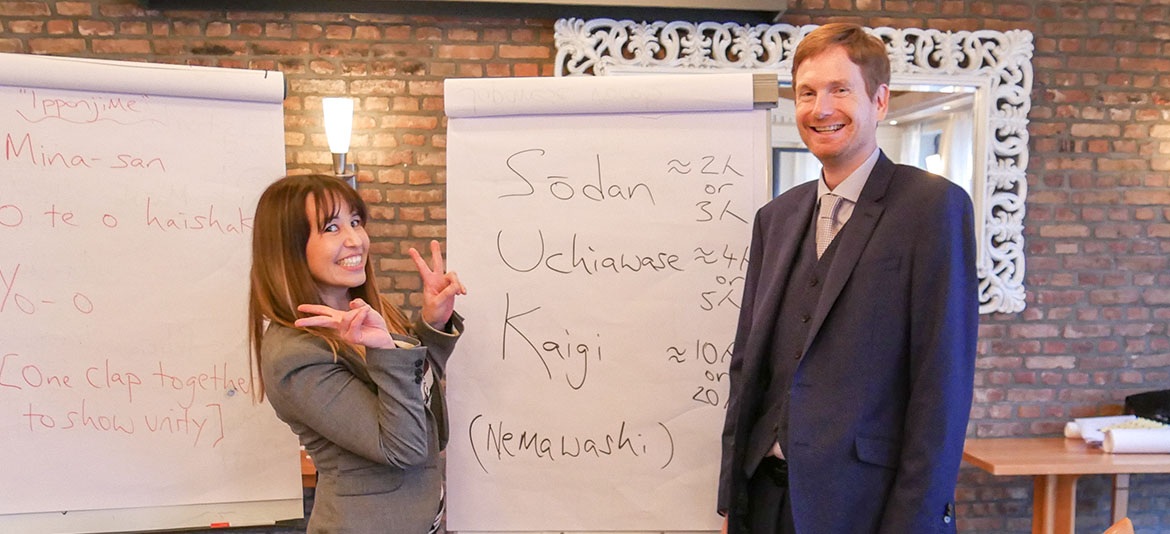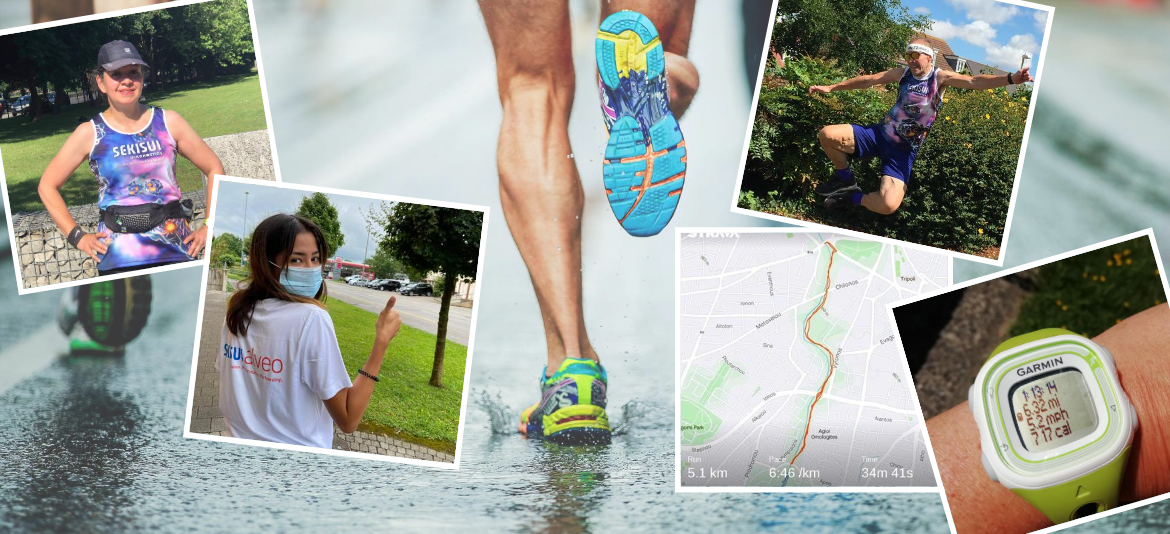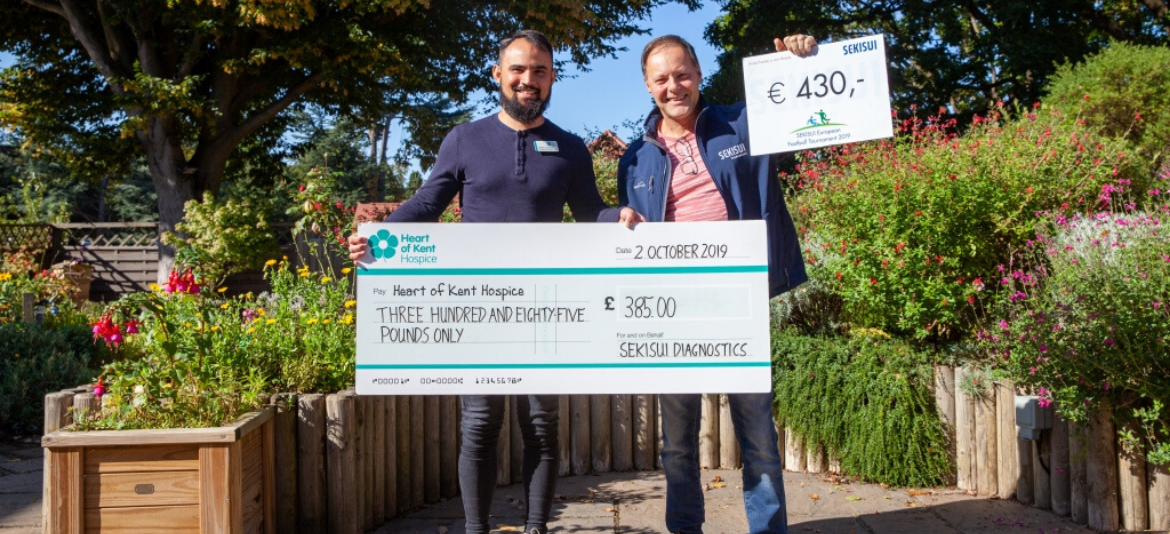Working for a global company like SEKISUI has a lot of advantages. There are subsidiaries all over the world and you can roll out businesses internationally. But that comes with some issues: how to communicate correctly with employees of different countries? How to translate guidance from the parent company correctly? And how to act the right way in everyday international business?
Brooke Brown and Gaz Monteath from Link Global Solution Inc. help SEKISUI to find answers to all these questions. Since 2012, they have both run Intercultural Communication Training for SEKISUI employees in Europe (and since 2004 in Japan) to maximize efficiency and productivity in the global workplace. The workshop topics this time were about how to strengthen the understanding of cultural differences in daily work between Europeans and Japanese.
The main target is to avoid misunderstandings and to communicate more smoothly and efficiently. We have already shared with you how their workshops are set-up. Now, the two facilitators themselves answered some questions for us about their work for SEKISUI:
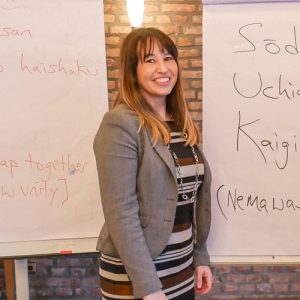 SEKISUI Newsroom: Please introduce yourself and give us a short description of your job (and what you are doing especially for SEKISUI).
SEKISUI Newsroom: Please introduce yourself and give us a short description of your job (and what you are doing especially for SEKISUI).
Brooke: My name is Brooke Brown, I’m from New Mexico in the US. I am half Japanese: my mother is from Hiroshima, and my father is from New Mexico. I am an instructor with Link Global Solution Inc., which means that I deliver the programmes that we offer. For SEKISUI, I have been working in Europe since 2012 and I also work for SEKISUI in Tokyo and in Kyoto with Japanese who are traveling overseas for work.
Gaz: I am Gaz Monteath, originally from the UK, but in Japan now for 27 years. I do three things at Link Global Solution Inc.: I sit on the management board, I manage a team, and I also do workshops like the European Communication Workshop for SEKISUI, which is the most fun. I have been working with SEKISUI since 2004.
SEKISUI Newsroom: Why is it so important to have regular workshops to strengthen cultural understanding, communication and interaction?
Brooke: We tend to make assumptions about our own businesses and we operate under those assumptions. When we are working for a company that is based in a culture that is not our own, we still filter everything through “this is how it would have been done in my home culture”. And so learning to understand both sides and figuring out where gaps may be is something that is very important. But it can’t be done just once, because we tend to forget. So cultural training is something that needs to be fully supported on both sides, so that everyone has a common vocabulary. We can then take a step back, try to understand the gaps, and then understand how to close them.
Gaz: I have a similar opinion. One of the dangers of our job is that we focus too much on the differences and not enough on the similarities. But one of the benefits of this kind of workshop is that people can see those similarities. We all care about quality, we all care for our customers, but how we communicate that care can be different. So, finding similarities is important. And working with Europeans is always a lot of fun, because we expect the differences, we expect people from different countries in the same room, we expect people to have different kinds of assumptions and ideas. At the same time, we love to get some sort of structure to that and we love to understand where we are coming from. Working with European groups is always enjoyable!
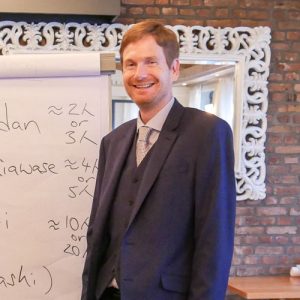 SEKISUI Newsroom: Do you already recognize a difference throughout the years of working with SEKISUI employees?
SEKISUI Newsroom: Do you already recognize a difference throughout the years of working with SEKISUI employees?
Gaz: For one thing, the hiring process has become different. In Japan, SEKISUI has made a real effort to hire people with overseas experiences and also to hire non-Japanese. There is a real effort to bring in some cultural diversity and to make the group – and the headquarters – more global. At the same time, SEKISUI is organising workshops to facilitate that process. That is one of the big differences that I feel.
SEKISUI Newsroom: Which topic is the most interesting one for you in the field of intercultural business communication?
Brooke: My favorite metaphor to explain is the “Rugby player” and the “Golf player”, which is about how education impacts on business meetings, presentations and discussions. People can relate to is immediately, because it is the education system they can remember. And we can do different roleplays to show them the issues.
I also really like to talk about “Tetris” and “Ameba” work attitudes. It is about the importance that people attach to job descriptions and their willingness to go outside the apparent boundaries of their jobs – or not. It is something I could talk about forever, because there are so many different aspects to it and so many gaps between the countries that come from it. A lot of companies have trouble in that area, so it is something that is quite important.
Gaz: I also like to talk about the “Tetris” and “Ameba” work attitudes, because there are a lot of layers that have meaning. If you are a manager, then you can think about how you manage your team. If you are running a business, then you are thinking about what kind of values you want to instill in your employees. What is the purpose of what you are doing? How should it be done?
And I think this also connects to different organisations and how they organise themselves. A lot of Western, North American and European, companies start to think, ”Do we need to change the way we organise the way we work together?”. Understanding the idea of “Tetris” and “Ameba” really helps business people to sort out these issues.
SEKISUI Newsroom: Thank you very much!

